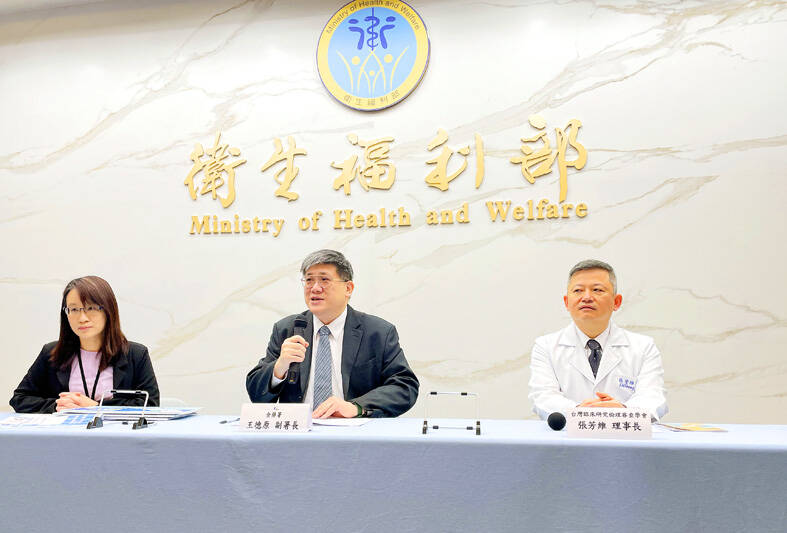Generic drugs can go through a bioequivalence (BE) study to determine if they have the same safety and efficacy of the innovator (brand-name) drugs, the Food and Drug Administration (FDA) said yesterday, as it clarified four common misconceptions about generic drugs.
When a brand-name drug’s patent expires, other companies can start selling generic versions of the drug, FDA Medicinal Product Division deputy head Lin Yi-chu (林意筑) said.
Of the 23,472 FDA-issued drug permit licenses that are currently valid, 17,510 are for generic drugs, or about 74 percent, Lin said.

Photo: CNA
A drug company that applies for a drug permit license for a generic drug with the same active ingredient, dosage form (the physical form in which a drug is administered) and dosage as a brand-name drug, needs to go through a BE study to prove that its safety and efficacy are the same as the brand-name drug, she said.
However, many people have misconceptions about generic drugs, including that they have not undergone clinical trials, their efficacy is only about 80 percent of the brand-name drugs, attending a BE study is a means to earn money, or that anyone can become a BE study participant, FDA Deputy Director-General Wang Der-yuan (王德原) said.
When an oral drug is administered, it is mainly absorbed in the intestines. In a BE study, blood tests are then taken to determine if the same amount of the active ingredient is released into the blood stream at the same rate as the brand-name drug, Lin said.
The mean values of the pharmacokinetic parameters of both medicinal products are compared and the 90 percent confidence intervals (CIs) are calculated. If the CIs are contained between 80 percent and 125 percent, the BE is demonstrated, she said, adding that this is an internationally agreed upon standard.
A BE study is a type of clinical research. The brand-name drug has already been proven safe and effective, so if the generic drug is proven to be bioequivalent to its brand-name counterpart, its safety and efficacy are also proven, Taiwan Association of Institutional Review Boards chairperson Chang Fung-wei (張芳維) said.
Participants of BE studies do not earn money, but the study organizers usually provide transportation, meals and nutrition fees, he said.
After a drug company gets an institutional review board approval for its BE study, it would send an informed consent form to participants. Those participants are required to strictly follow the instructions detailed in the form, including limits on eating certain foods or taking other drugs, Chang said.
The entire study process must also follow the good clinical practice guidelines to ensure the reliability of clinical trial results and the protection of patients, he added.
In addition, BE study participants must be healthy adults, and there are usually eligibility criteria, such as age, gender and body mass index (BMI) range among others, as well as the exclusion of people with chronic or acute illnesses, pregnant or breast-feeding women, and those taking certain prescription drugs, Chang said.

Taiwan is stepping up plans to create self-sufficient supply chains for combat drones and increase foreign orders from the US to counter China’s numerical superiority, a defense official said on Saturday. Commenting on condition of anonymity, the official said the nation’s armed forces are in agreement with US Admiral Samuel Paparo’s assessment that Taiwan’s military must be prepared to turn the nation’s waters into a “hellscape” for the Chinese People’s Liberation Army (PLA). Paparo, the commander of the US Indo-Pacific Command, reiterated the concept during a Congressional hearing in Washington on Wednesday. He first coined the term in a security conference last

Prosecutors today declined to say who was questioned regarding alleged forgery on petitions to recall Democratic Progressive Party (DPP) legislators, after Chinese-language media earlier reported that members of the Chinese Nationalist Party (KMT) Youth League were brought in for questioning. The Ministry of Justice Investigation Bureau confirmed that two people had been questioned, but did not disclose any further information about the ongoing investigation. KMT Youth League members Lee Hsiao-liang (李孝亮) and Liu Szu-yin (劉思吟) — who are leading the effort to recall DPP caucus chief executive Rosalia Wu (吳思瑤) and Legislator Wu Pei-yi (吳沛憶) — both posted on Facebook saying: “I

The Ministry of Economic Affairs has fined Taobao NT$1.2 million (US$36,912) for advertisements that exceed its approved business scope, requiring the Chinese e-commerce platform to make corrections in the first half of this year or its license may be revoked. Lawmakers have called for stricter enforcement of Chinese e-commerce platforms and measures to prevent China from laundering its goods through Taiwan in response to US President Donald Trump’s heavy tariffs on China. The Legislative Yuan’s Finance Committee met today to discuss policies to prevent China from dumping goods in Taiwan, inviting government agencies to report. Democratic Progressive Party Legislator Kuo Kuo-wen (郭國文) said

The Ministry of Economic Affairs has fined Taobao NT$1.2 million (US$36,900) for advertisements that exceeded its approved business scope and ordered the Chinese e-commerce platform to make corrections in the first half of this year or its license would be revoked. Lawmakers have called for stricter supervision of Chinese e-commerce platforms and more stringent measures to prevent China from laundering its goods through Taiwan as US President Donald Trump’s administration cracks down on origin laundering. The legislature’s Finance Committee yesterday met to discuss policies to prevent China from dumping goods in Taiwan, inviting government agencies to report on the matter. Democratic Progressive Party